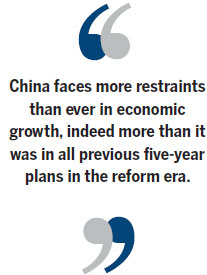Look past indexes for the big picture
Updated: 2015-10-30 07:32
By Ed Zhang(China Daily Europe)
|
|||||||||||
China's economic growth is now determined more by overall conditions than its 'policy weapons'
Seven percent or not 7 percent? There has already been much debate about China's GDP growth rate in the forthcoming 13th Five-Year Plan (2016-20).
The debate may give a false impression that no matter what growth target the government sets, the country can achieve it, despite all difficulties. Actually, the range of choice is narrow.
Only with careful management can the country keep its annual growth rate between 6 and 7 percent on the national level. On the provincial level, there are already signs that, at times, even 6 percent would be hard to achieve.
China faces more restraints than ever in economic growth, indeed more than it was in all previous five-year plans in the reform era.

Just a few years ago, GDP was hardly a concern. Often the nation over-achieved its GDP targets, and economists' most-frequent complaint was about overheating, or too much investment in the same things. But that growth cycle is well past us.
Few people have pointed out that in China today growth is less of a short-term issue than a long-term issue. How fast it can keep expanding is less determined by how many short-term measures - or so-called policy weapons - can be used. Increasingly it is determined by the country's overall conditions, which cannot be measured entirely in economic terms.
If, as Chinese leaders expect, the country's growth no longer comes mainly from making cheap goods, but from more value-added production and services, there will be a major change: The old way of making value will be replaced by a new way of making higher value. Old industries, along with their assets, will be replaced by more-creative new industries.
That would mean that the largest number of human resources available will shift to doing something different, possibly following some new ideas. By checking what China's largest, and most dynamic, group of workers is doing, it isn't difficult to tell where the new growth will be.
In China, farmers are no longer focused only on raising the output from their private plots, as they were during the 1980s.

Entrepreneurs are no longer mostly prospering by making things that state-owned enterprises failed to provide, as they were during the 1990s. Wherever they go, they only meet with ever-stiffer competition from home and abroad.
Young people are no longer chasing higher wages in foreign investment companies, as they were in the 2000s. That's because these companies do not have that many vacancies, and do not necessarily offer higher wages for low-skilled workers.
College graduates (or their parents) are no longer yearning for the job security, if not privileges, of public service, as they have in the past. The anti-graft campaign has resulted in strict workplace discipline.
The above phenomena were foreshadowed by policies and policy changes. Indexes and statistics only followed them as they happened.
At present, the meeting point of the most-novel technology and the largest number of workers is e-commerce - from the competing fleets of electric-powered mopeds in urban delivery services, to the virtual stores selling just about anything online, to nascent and sometimes shady online financial services.
In a recent meeting with corporate leaders in Zhejiang province, Jack Ma, the founder of China's largest e-commerce company, Alibaba, said he was very optimistic about China. He explained, in quite a dialectical way, that the economy would be worse than most people think in the next five to 15 months, but in the next five to 10 years China could be second to none in terms of economic opportunities.
So, what's the point of talking only about next year's GDP, or any short-term economic index? The more interesting part of China watching is always its policies and the social consequences.
The author is editor-at-large of China Daily. Contact the writer at edzhang@chinadaily.com.cn
(China Daily European Weekly 10/30/2015 page13)
Today's Top News
China to allow two children for all couples
China's central bank dismisses QE rumor
Chinese premier holds talks with German chancellor
Refugee crisis continues to create rift between pro-Europeans, Eurosceptics
Rescue operations continue in quake-stricken Afghan provinces
Dutch King receives Dutch rabbit with Chinese characteristics
Silk Road Fund to invest $100m in China International Capital Corp's IPO
Over 200 dead as huge earthquake shakes S. Asia
Hot Topics
Lunar probe , China growth forecasts, Emission rules get tougher, China seen through 'colored lens', International board,
Editor's Picks

|

|

|

|

|

|






